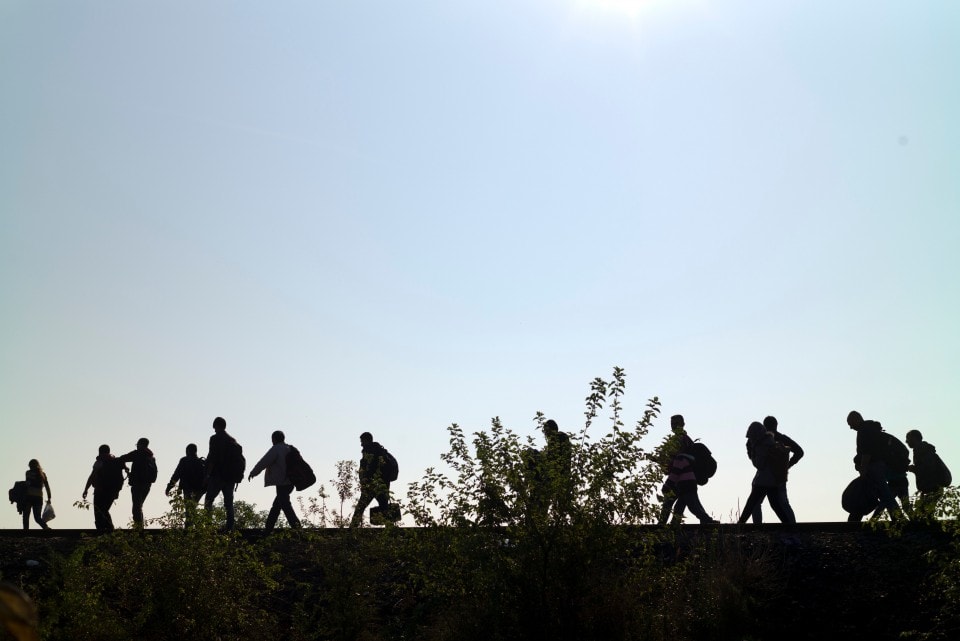Nathan Gardels is the editor-in-chief of Noema Magazine. He is also the co-founder of and a senior adviser to the Berggruen Institute.
Societies and cultures are not closed systems, but the capacities of states are limited by the fiscal and economic realities of territories with boundaries. As such, nation states have the right to control immigration based upon criteria that not only ensures newcomers will abide by the values and norms of the host society but also can contribute positively to the economy and tax base of a given jurisdiction and not be a drain on finite resources. Open societies, in short, require defined borders.
These two issues — how immigrants from other cultures and religions fit in to the nations on whose shores they have arrived and how they integrate into the economic life and social welfare arrangements of that nation — have become front-and-center concerns in a world of human flows that are more mobile than ever before.
This week, as U.S. President Donald Trump once again renewed his pledge to build a wall along the Mexican border, The WorldPost examines responses to the social tensions that are part and parcel of societies growing ever more diverse though immigration.
Former British Prime Minister Tony Blair has taken the lead in redefining the immigration debate from a center-left position. “Those of us in favor of open, liberal, tolerant societies,” he writes from London, “need to recognize that movement on this scale is creating real challenges for policymakers in established democracies.”
In a reference to the “take back control” sentiments that helped drive Brexit, Blair says: “There can be pressure on services within communities from an influx of migrants or refugees, downward pressure on wages in certain sectors of the economy, and questions of cultural integration — especially when immigrants are from more conservative Muslim backgrounds. And there is anxiety that governments do not properly control who is allowed into the country and who has a right to stay.”
“I sometimes hear it argued, particularly on the left, that the very act of engaging seriously with those concerns amounts to a form of political surrender and that instead of pandering to people’s anxieties, centrist politicians should make the case more explicitly for the benefits of immigration. This is not just misguided. It is dangerous,” he declares, arguing that it requires a progressive response.
“Many people are not actually anti-immigrant,” Blair continues. “They understand that their country needs certain categories of migrant workers, particularly the highly skilled. And they’re not indifferent to the plight of refugees. But they believe — not unreasonably — that countries should have the right to control their own borders and that the system is fundamentally not well managed.”
Sweden is widely regarded as among the most tolerant and liberal societies in the world. But as Aje Carlbom writes from Malmö, immigration there, primarily Muslims from the Middle East, has created a new problem: “imported anti-Semitism.” Carlbom paints a complex picture of the ethical and moral dance between Islamophobia and anti-Semitism in a relatively homogenous Nordic culture.
“The new anti-Semitism is expressed by actors who in most other debates in multicultural society belong to a category of victims in relation to the powerful majority,” he writes. “An important argument from pluralists is that citizens should avoid criticizing the victim for holding any ‘bad’ ideas since that is an act of Islamophobia or racism. In Sweden, it seems as if the myth of the ‘purity’ of the oppressed has a strong hold over thinking.”
The ambivalence toward criticizing some Muslims for their anti-Semitism, he continues, is “quite unsurprising since it is grounded in a political culture with powerful taboos against criticizing culturally different persons. To attack this imported anti-Semitism, even when everyone agrees that unacceptable ideas are expressed, is associated with the political risk of striking from above and ‘blaming the victims.’”
Former Canadian Prime Minister and co-founder of the G-20 Paul Martin takes on the immigration issue by focusing on why people migrate in the first place. “More than 10 million young Africans enter the workforce each year, yet the continent creates only about three million jobs annually,” he writes. Rather than focusing on keeping out migrants trying to close that gap by heading north, he argues, more effort should be focused on “giving the world’s beleaguered people fewer reasons to leave home.”
For Martin, that means better governance in Africa and means Europe joining together with global governing institutions such as the G-20 and the African Development Bank. Programs aimed at creating more opportunity for the burgeoning youth population through investment in education and infrastructure, along with regional market integration, will also help foster economic growth.
Reasonable accommodation of immigrants and host societies to each other is the only alternative to the barbarism of a clash of civilizations. And refugees require special consideration. But avoiding a backlash that invites nativism entails aligning the humanitarian impulse with economic realities. Bad faith results from good intentions if the capacity to fulfill moral claims is lacking. To ignore this dimension in any country undermines the social contract that is the foundation of effective governance.
This was produced by The WorldPost, a partnership of the Berggruen Institute and The Washington Post.
ADVISORY COUNCIL: Jacques Attali, Shaukat Aziz, Gordon Brown, Fernando Henrique Cardoso, Jack Dorsey, Mohamed El-Erian, Francis Fukuyama, Felipe Gonzalez, John Gray, Reid Hoffman, Fred Hu, Mo Ibrahim, Alexei Kudrin, Pascal Lamy, Kishore Mahbubani, Alain Minc, Dambisa Moyo, Laura Tyson, Elon Musk, Raghuram Rajan, Nouriel Roubini, Nicolas Sarkozy, Gerhard Schroeder, Peter Schwartz, Amartya Sen, Jeff Skoll, Michael Spence, Joe Stiglitz, Larry Summers, George Yeo, Fareed Zakaria, Ernesto Zedillo, Zheng Bijian, Marek Belka, Tony Blair, Jacques Delors, Niall Ferguson, Anthony Giddens, Otmar Issing, Mario Monti, Robert Mundell, Peter Sutherland, Guy Verhofstadt, James Cameron





